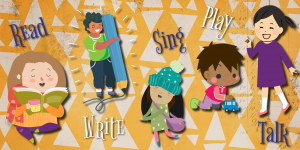
Playtime isn’t all about silliness. Play helps your child:
- handle stress
- build their understanding of the world
- prepare for future challenges
Play begins around six weeks old with smiling. Your baby is happy to see you and to see you smiling back at them!
Playtime does not require a lot. Cardboard boxes, wooden blocks, and outdoor time are all wonderful for your child. The most important element is you. Kids want to spend time with you and other people, having fun and exploring the world around them.
Activity Suggestions
Playing with toys and others outshines digital media for all ages. Screen time needs to be balanced with real world play. Studies show that real-time play is superior to digital media for a child’s growth (Yogman et al. 9).
Your child’s vocabulary will blossom with face-to-face playtime with physical toys. The American Academy of Child and Adolescent Psychology has more information about screen time if you are interested in learning more.
Take a look at these books from the Pima County Public Library for fun playtime ideas for little ones:
150+ Screen-free Activities for Kids
Babies
- Smiling and cooing back and forth between you and your baby is the start of play. Babies are learning how to take turns.
- Peek-a-Boo, Patty Cake, Trot Trot to London, and other games that involve repetition are fun for baby and form an understanding of their interactions with adults.
Toddlers
- Have an imaginary adventure, whether it be a tea party, superhero session, or play doctor. Your child is developing their creativity. Ask them questions while you play to develop their vocabulary. “What flavor of crumpets do we have for our tea party?” “Who is the bad guy and how are we going to defeat them?” “What is wrong, doctor? How can you help me?” Your child will practice using new words and learn about the world around them from these imaginary games.
- Have a dance party! Physical exercise helps minimize stress and aid with coordination. Try standing on one leg or hopping around. Do a cartwheel! Whatever gets your child moving and playing with others is a great thing.
Using your Pima County Public Library card, download some free songs from Freegal to dance to with your child.
Preschoolers
- Set up a learning zone based around a specific topic. Have you been talking about farm animals? Set up a little farm out of cardboard or plastic toys. Is your child interested in dinosaurs? Build a baking soda and vinegar volcano or set up a dinosaur forest made of paper or broccoli for an edible version. Ask questions and engage your child as you play.
- Simon Says, Duck Duck Goose, and Red Rover are great ways to practice listening and giving directions. Any game that involves one person actively listening and the other expressing themselves will help your child learn to work with others.
- Play a board game! Learning to win and lose graciously is a part of working with others in society. Children also learn how to cooperate and communicate with group games.
Sources
- Yogman M, Garner A, Hutchinson J, et al; AAP COMMITTEE ON PSYCHOSOCIAL ASPECTS OF CHILD AND FAMILY HEALTH, AAP COUNCIL ON COMMUNICATIONS AND MEDIA. The Power of Play: A Pediatric Role in Enhancing Development in Young Children. Pediatrics. 2018;142(3):e20182058
- “The Power of Play.” HealthyChildren.org, 2024
-Megan, Children's Team, Kirk-Bear Canyon Library
 Read, Write, Talk, Sing, Play!
Read, Write, Talk, Sing, Play!
Play comes so naturally to children and is an essential element to lifelong success. When children play, they are practicing and perfecting early literacy and life skills!
Read more about early literacy and how you can make a difference in your child's life.


